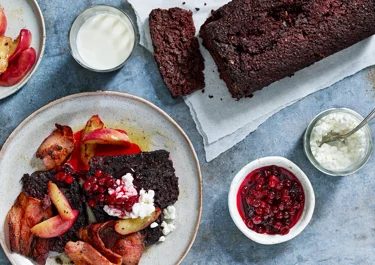Black pudding

Our black pudding recipe is like stepping into British and Irish cooking history. A savoury breakfast classic for generations, black pudding is now used to complement a wide range of dishes. Our version combines wholesome rye flavour with the natural sweetness of apple and the depth of traditional spices.
Ingredients
|
Red onion
|
1 |
|---|---|
| 2 tbsp | |
|
Pig blood
|
500 ml |
|
Light beer without alcohol
|
300 ml |
|
Coarse rye flour
|
350 ml |
|
Butter
|
75 g |
|
Apple
|
1 |
|
Light syrup
|
50 ml |
|
Salt
|
2 tsp |
|
Ground ginger
|
1 tsp |
|
Ground allspice
|
½ tsp |
|
Dried marjoram
|
½ tsp |
|
Ground white pepper
|
½ tsp |
|
Ground cloves
|
¼ tsp |
Optional accompaniments
|
Rimmed flank pork, fried
|
|
|---|---|
|
Stir-fried lingonberries
|
|
|
Butter-fried red apples
|
|
|
Cottage cheese
|
Instructions
FAQ: Questions about black pudding
Whether you are an eager food enthusiast or an experienced chef, these frequently asked questions will help you master the preparation and enjoyment of this robust British classic. Learn about the background and its many uses in the kitchen.
What is black pudding?
Black pudding is a savoury blood sausage with roots in the UK and Ireland. It is usually made from pig's blood and cereals such as oatmeal, oat groats, or barley groats. Herbs and spices such as pennyroyal, mint, thyme, or marjoram are used to season the mixture.
Can you make black pudding without sausage casings?
Yes, you can make black pudding without sausage casings by baking it in a loaf pan. This method is great for home cooks who might not want to use casings or find them hard to handle. You just mix the ingredients, pour them into the pan, and bake covered with foil until the pudding is firm.
Can you freeze black pudding for later use?
Yes, you can freeze black pudding. Once it has cooled down, wrap it tightly in cling film or foil. This helps keep it fresh. You can store black pudding in the freezer for several months, which is great if you want to prepare it beforehand.
Tips: Making the best black pudding
These practical tips will help you bring out the best in your black pudding. They cover everything from the cooking process to how to store leftovers.
Choosing the right pan for black pudding
To make perfect black pudding, choose a glass loaf pan to prevent flavour changes from a reaction with the metal. If you do not have a glass pan, line a metal pan with baking paper to protect the flavour of the pudding while it bakes.
Adjusting texture for the perfect black pudding
To achieve a firm and satisfying black pudding, check the thickness of the batter before you bake. If it is too thin, the pudding may come out too soft or not set at all. Use less liquid or add more rye flour to thicken the mix. This balance will give your black pudding the right firmness and texture.
Storing leftover black pudding
Wrap it tightly in plastic wrap or aluminium foil and store it in an airtight container or resealable plastic bag. Alternatively, you can place it in a covered container in the refrigerator. For the best quality, consume it within three to four days.
Try our recipe for homemade black pudding
Homemade black pudding brings delicious and robust flavours to any meal. It has been a breakfast tradition for years and still is. As time has passed, black pudding has been enjoyed on many occasions. It is known for its distinct richness and deep layers of complexity. Whether you enjoy time-honoured flavours or are a home cook looking to try something new, this recipe invites you to experience a piece of beloved food tradition.
Tasty blood sausage with wholesome rye and juicy apples
Wholesome rye and juicy apples bring hearty and sweet flavours to the blood sausage. There is a reason the two ingredients work wonderfully together. The rye flour adds a rustic texture and imparts a few earthy notes. To balance that, small slices of apples provide juicy sweetness. They come as small, tender surprises in the rich blood sausage. The result is a black pudding full of tradition and authentic flavours.
Aromatic notes from warm spices
Black pudding is full of exciting flavours and aromas. They come from a selection of warm spices, contributing to the characteristic hearty feel. Ground ginger brings nuance in the form of subtle heat along with a slight citrusy zing. The warm allspice weaves through the black pudding to give it a subtly sweet touch. Ground cloves add a subtle hint of sweetness and a touch of exotic spice.
A beloved British and Irish breakfast staple
Black pudding goes back a long time. It has been a breakfast staple in Britain and Ireland for years. You will usually find it side by side with eggs, bacon, and grilled tomatoes. It traditionally makes up a part of a complete breakfast with its rich and hearty flavours. Every region puts its spin on it by using slight variations of herbs and spices, so what is traditional to some may be new to others. Our recipe goes for classic flavours you can use for breakfast with friends and family on relaxing mornings.
You can never go wrong with tradition. Try a few of our delicious British classics, like the tasty toad in the hole or a savoury shepherd's pie. Both are great, hearty options for big family meals.
Discover the different ways to serve black pudding
Fried slices of black pudding are perfect next to eggs, bacon, toast, and other sides. But while black pudding is a classic breakfast staple, it can be used in many flavourful ways. It stands out with its deep flavour and can be served with sweet, sour, and crispy sides.
The soft blood sausage is excellent with fried, rimmed flank pork and makes up the hearty part of a full meal. Stir-fried lingonberries are also a popular choice. They give the meal a sharpness that cuts through the rich black pudding. As a bonus, they add a refreshing zing and a vibrant red colour to your plate. Butter-fried red apples have both a sweetness and a sourness that go well with the black pudding. Top off with a dose of fresh cottage cheese. All of these easy sides create a visually sprawling meal full of flavours.
Tailor the recipe to your palate
Get creative and tailor the black pudding recipe to your taste buds. While the recipe is steeped in tradition, you can still play around with ingredients and cooking methods. It has become popular to mix black pudding into salads, quiches, and other traditional dishes as a substitute for meat. So, feel free to explore the many possibilities.
For a firmer black pudding, try buckwheat instead of rye flour. Buckwheat gives a firm texture and adds a rich, savoury flavour that works well with the spices. Adding finely chopped garlic can also boost the flavour and make your black pudding even more delicious. Consider serving black pudding with pickled vegetables. They are tangy and add a sharp contrast to the deep flavours. A simple, crisp green salad with a zesty dressing is also a great accompaniment.
Feel free to cook your blood sausage using different methods. It is a simple way to personalise the dish without changing its core identity. Instead of frying it, grill your black pudding to give it a smoky flavour and a charred exterior. Steam your black pudding if you prefer it moist and tender. This gentle cooking method keeps the pudding juicy and soft.




&format=webp)




&format=webp)